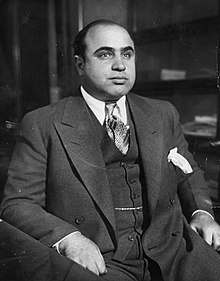Al Capone
| Al Capone | |
|---|---|

Al Capone in 1930
|
|
| Born |
Alphonse Gabriel Capone January 17, 1899 Brooklyn, New York, U.S. |
| Died | January 25, 1947 (aged 48) Palm Island, Florida, U.S. |
| Resting place | Mount Carmel Cemetery |
| Nationality | American |
| Other names | , Big Al, Big Boy, |
| Occupation | Gangster, bootlegger, racketeer, boss of Chicago Outfit |
| Height | 5' 10½" (1,79 m) |
| Criminal charge | Tax evasion |
| Criminal penalty | 11-year sentence in Atlanta U.S. Penitentiary and Alcatraz |
| Spouse(s) | Mae Capone (m. 1918–1947) |
| Children | Albert Francis "Sonny" Capone (1918–2004) |
| Signature | |
Alphonse Gabriel "Al" Capone (/æl kəˈpoʊn/; January 17, 1899 – January 25, 1947) was an American gangster who attained fame during the Prohibition era as the co-founder and boss of the Chicago Outfit. His seven-year reign as crime boss ended when he was 33 years old.
Capone was born in Brooklyn in New York City to Italian immigrants. He was considered a Five Points Gang member who became a bouncer in organized crime premises such as brothels. In his early twenties, he moved to Chicago and became bodyguard and trusted factotum for Johnny Torrio, head of a criminal syndicate that illegally supplied alcohol—the forerunner of the Outfit—and that was politically protected through the Unione Siciliana. A conflict with the North Side Gang was instrumental in Capone's rise and fall. Torrio went into retirement after North Side gunmen almost killed him, handing control to Capone. Capone expanded the bootlegging business through increasingly violent means, but his mutually profitable relationships with mayor William Hale Thompson and the city's police meant that Capone seemed safe from law enforcement.
Capone apparently reveled in attention, such as the cheers from spectators when he appeared at ball games. He made donations to various charities and was viewed by many to be a "modern-day Robin Hood". However, the Saint Valentine's Day Massacre of gang rivals, resulting in the killing of seven men in broad daylight, damaged Chicago's image—as well as Capone's—leading influential citizens to demand governmental action and newspapers to dub him "Public Enemy No. 1".
...
Wikipedia
